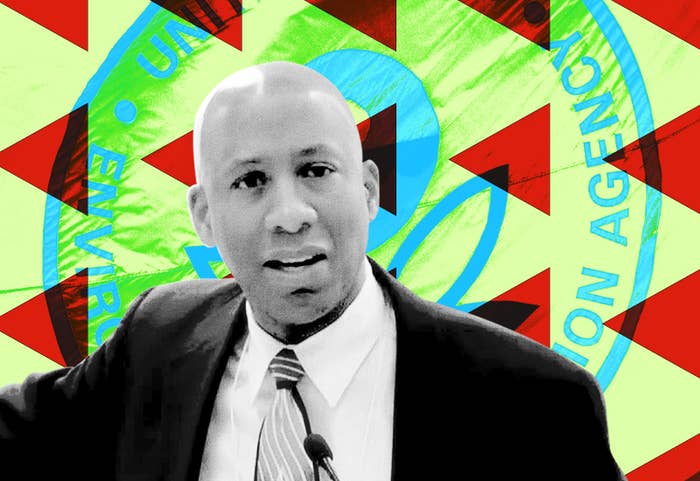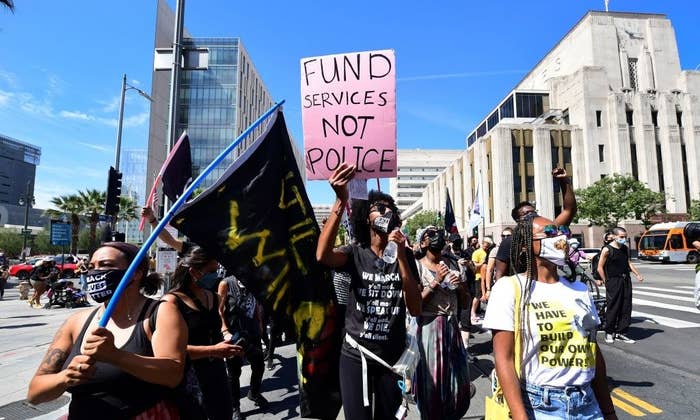Ahead of his Senate confirmation hearing on Wednesday, the environmental lawyer has become a target of the far right’s bogus narrative around race.
Zahra Hirji BuzzFeed News Reporter
Posted on September 14, 2021

BuzzFeed News; Getty Images / Via YouTube / youtube.com
Carlton Waterhouse, the Biden administration’s nominee to run the Environmental Protection Agency office in charge of cleaning up the nation's most toxic waste sites, has spent his career fighting policies that hurt people of color. Now, in the lead-up to his Senate confirmation hearing on Wednesday, he's being called a "racist" and "extremist" for his positions on law enforcement funding and reparations policy.
It’s the Republicans’ latest attempt to perpetuate a culture war around diversity and critical race theory. Republican Sen. Tom Cotton of Arkansas told Fox News that Waterhouse was an “extremist” who “supports fringe environmental and racist policies.” Thomas Jones, cofounder of the American Accountability Foundation, a conservative nonprofit that launched earlier this year, said Waterhouse is “a racist” who is “obsessed with pushing racially-divisive rhetoric and policies into every aspect of public life.”
In an interview with BuzzFeed News, Waterhouse addressed the criticisms for the first time and spoke about his own experiences with racial discrimination, including having a cousin who was shot and killed by the police. These experiences have indelibly shaped his work: He’s fighting for everyone to breathe clean air and drink clean water, especially people of color and low-income communities who disproportionately live in the shadow of pollution.
In response to the attacks on his character and work, Waterhouse said: “Those kinds of distortions just misrepresent really what I've fought for and the kinds of things that I've been advocating for.”
The criticisms come as the Biden administration has aggressively pushed for all agencies to prioritize environmental justice, creating a new White House Environmental Justice Interagency Council to bolster the government’s progress. As part of this push, earlier this month the EPA released a report showing how climate change disproportionately impacts people of color.
But the clash surrounding Waterhouse’s confirmation also comes as conservatives have increasingly been misappropriating conversations on equity to weaponize them against Democrats.
Environmental justice advocates who support Waterhouse’s nomination say he’s gotten extra heat for being Black and advocating for Black people.
“We've seen Black and brown women and men who've gone through the confirmation process, and there is always that additional set of scrutiny that is placed upon them,” said Mustafa Santiago Ali, the Obama-era head of the EPA’s Office of Environmental Justice. “It’s unfortunate when people are not willing to also highlight the amazing things that people have done to help to make their country stronger, to make their communities stronger.”

Frederic J. Brown / AFP via Getty Images
Activists and supporters of Black Lives Matter march on the one-year anniversary of George Floyd's death on May 25, 2021, in Los Angeles.
Waterhouse’s father grew up in a small town in East Texas, leaving at the age of 17 and lying about his age to serve in a segregated unit in the military “to get away from that mistreatment” he faced growing up in the Jim Crow South, Waterhouse said. His maternal grandmother, who is still alive today, worked for the James River Country Club in Newport News, Virginia, which did not have any Black members through the late 1980s.
At Pennsylvania State University, Waterhouse studied engineering and ethics of technology. He then graduated from Howard University School of Law and later got a doctorate in social ethics from Emory University. He and his older brother were the first people in his family to graduate from college.
“When I was a student at Penn State, I dealt with a lot of racial discrimination myself,” he said. “Just from riding my bike downtown, where people threw bottles and yelled racial epithets at me.”
In between the degrees, Waterhouse spent nine years working as an attorney on high-profile pollution enforcement cases for the EPA. He then taught environmental law for over a decade, including recently leading the Howard University Environmental Justice Center. As part of his research, he’s written about lead poisoning in children of color, and about reparations for descendants of enslaved people. It’s the latter that’s recently garnered negative attention.
“Rather than a crowning achievement of American democracy,” Waterhouse wrote in a 2006 paper, “the civil rights legislation of the 1960s and 1970s represented one more step in a series of unfortunate legal events that ultimately reflected the dominant attitude of society’s white majority toward ending the Jim Crow practices of the south.”
Directly referencing this excerpt and others, the American Accountability Foundation wrote a scathing blog post claiming that Waterhouse is “so radical he opposes the Civil Rights legislation of the 1960s and 1970s.”
That allegation, Waterhouse said, is “ludicrous.”
His paper noted “that it was unfortunate that the question of reparations for people who had been the victims of the racial discrimination in the past” were not included in the legislation, he said. The result was that people like his grandmother — who lived most of their adult lives facing racist policies dictating whether they could buy homes, get healthcare, or vote — never had those losses recovered.
More recently, as protests swept the nation last year following the police killings of George Floyd and Breonna Taylor, Waterhouse joined hundreds of legal experts in a letter expressing support for defunding the police.
When asked about this, Waterhouse told BuzzFeed News he had a personal connection with police violence.
His cousin Marcus-David Peters, a teacher in Richmond, Virginia, was experiencing a mental health crisis in May 2018. Unarmed, he got into his car naked and crashed it. The police officer who responded to the scene shot and killed him.
“If you watch the video online, it's just really heartbreaking,” Waterhouse said.
Waterhouse said his support for defunding the police was about rethinking the role of law enforcement in society. “When I was talking about how we can address the police issues that were being raised, at the time, I was talking about making funds available for additional services, like mental healthcare,” he said. “I don't believe in abolishing the police. I think the police are important. They serve an important role in our society.”

Patrick T. Fallon / AFP via Getty Images
A massive Royal Dutch Shell manufacturing complex in Louisiana’s St. Charles Parish releases plumes of smoke into the air after Hurricane Ida knocked out its power on Aug. 30. NOT SMOKE THIS IS TOXIC POLLUTION INCLUDING CARCINOGENIC PARTICULATES
Waterhouse has been serving as the deputy in the EPA’s Office of Land and Emergency Management since February. His vision for the office is to prioritize environmental justice, addressing everything from legacy pollution issues, like lead poisoning, to newer pollutants like PFAS.
If confirmed, he will oversee the Superfund program, which is dedicated to cleaning up about 1,300 large hazardous waste sites across the nation. He’ll also manage the Brownfields program, which offers grants, job training, and other assistance to assess, clean up, and reuse contaminated properties. His office is also among those in the government that respond to environmental disasters, such as Royal Dutch Shell’s petrochemical plant in Norco, Louisiana, spewing black smoke into the air after Hurricane Ida hit the South earlier this month.
“Environmental justice means nobody should have to live with pollution in their yards, in the water that they drink, in the creeks that are next door to them, or the lakes that they fish in to get food,” he said.
Biden’s approach to environmental justice stands in stark contrast to the former president Donald Trump, who, in his first budget proposal, called for ending all funding for the EPA Office of Environmental Justice.
The Trump administration, Mustafa Santiago Ali said, tapped people for the EPA who “did not have a track record on caring about the environment and definitely did not have a record of helping to protect those who we know our environmental laws have fallen short on.” Roughly a month after Trump took office, Ali resigned from the EPA.
Trump’s initial pick to lead the same EPA office was Albert Kelly, who had been placed on a federal ban from banking and had no environmental cleanup experience. Kelly resigned about a year into the job amid ethics inquiries.
His successor, Peter Wright, had previously worked as Dow Chemical Company’s managing counsel and represented the company in negotiations with environmental regulators over its handling of hazardous waste.
“We have a totally different paradigm now,” Ali said. “We have a lot of people who truly care. And not only do they care, but they have expertise and they have a record.” He included Waterhouse among those.
It’s unclear whether Waterhouse’s past comments on race will come up during his Senate hearing, although the Biden administration is confident he will be confirmed. And he’s already met and won the support of Sen. Tom Carper, a Delaware Democrat and the chair of the Senate Environment and Public Works Committee, which is hosting the nomination hearing.
“Carlton Waterhouse has devoted his career to protecting communities across the country from hazardous waste and looking out for those who have suffered the most,” Carper told BuzzFeed News in an emailed statement. “I look forward to getting him confirmed in this important role.”
Waterhouse is unsure what will happen at the confirmation hearing, but he said he will stay true to the ideals that have driven him throughout his career.
“The truth is that my values relate to protecting all communities, and they relate to protecting all people, particularly people who find themselves vulnerable and marginalized around issues like environmental protection and environmental quality,” he said. “It’s just been really important for me, through my interactions, to stand up and say things that will help move the ball forward.”
The EPA Just Announced A $50 Million Push To Help Underserved Communities Tackle Pollution And Get JobsZahra Hirji · June 25, 2021
Inside "The Very Secret History" Of The Sunrise MovementZahra Hirji · Aug. 12, 2021
In Jackson, Mississippi, You Can Go Into Debt Trying To Take A ShowerBrianna Sacks · April 7, 2021
This Louisiana Town Is A Bleak Forecast Of America's Future Climate CrisisZahra Hirji · June 17, 2021

Zahra Hirji is a science reporter for BuzzFeed News and is based in Washington, DC
No comments:
Post a Comment